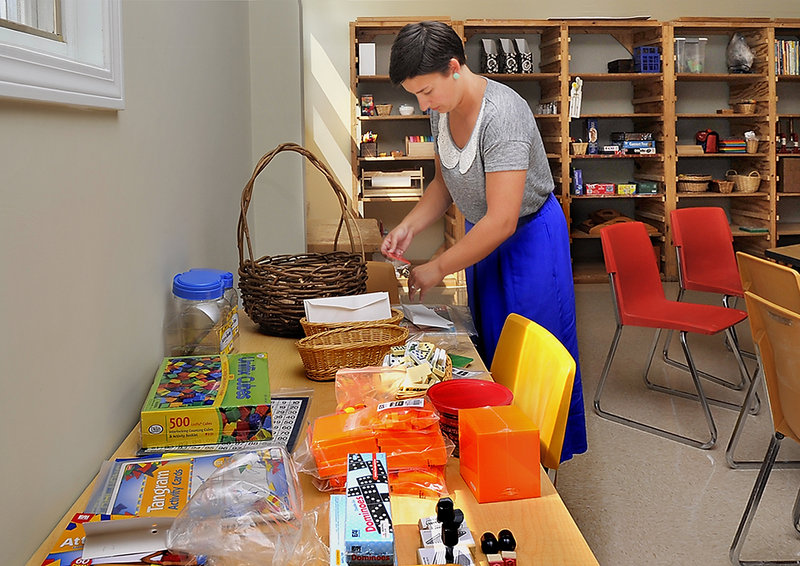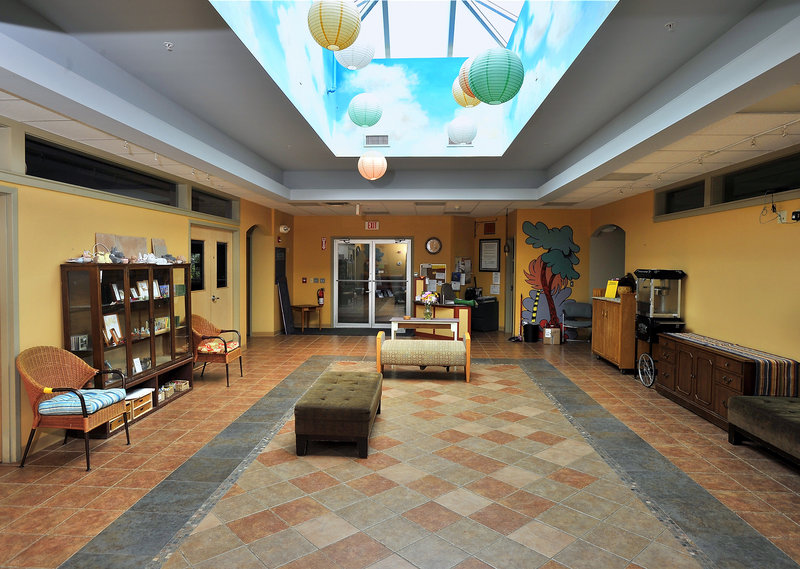Three new charter schools will open this week, bringing the total statewide to five, just two years after Gov. Paul LePage signed legislation making Maine the 41st state to allow them.
“To have five schools open is incredibly exciting,” said Roger Brainerd, executive director of the Maine Association for Charter Schools.
Charter school operators say they are excited — as are their students and families — to have an alternative to traditional public schools.
“Parents are really passionate about taking care of their kids and giving their kids the best opportunity, and they’ll fight for it,” said Justin Belanger, executive director of Cornville Regional Charter School, which opened last year for 60 students in kindergarten through sixth grade.
The other charter school that opened last year was the Maine Academy of Natural Sciences, known as MeANS, located at the former Good Will-Hinckley School in Fairfield.
The three new schools opening this fall are Baxter Academy for Technology and Science in Portland, Fiddlehead School for Arts & Sciences in Gray, and Harpswell Coastal Academy.
A total of 392 students are enrolled in the schools, ranging from pre-kindergarten through 12th grade. The largest, Baxter Academy, has 135 students. Fiddlehead School is the smallest, with 42 students.
Each school serves different ages and has a unique educational philosophy, but there are common threads. All emphasize student-led instruction and hands-on project work, and charter school backers emphasize that the schools are meant to serve as an alternative to local schools — not to mirror them.
MeANS, Fiddlehead, Cornville and Harpswell all have significant environmental learning components, while Baxter places an emphasis on science, technology, engineering and math — or STEM — and will teach Mandarin Chinese.
CHARTERS EMBROILED IN POLITICS
Even though the law authorizing charter schools is established, there continues to be vigorous debate about the pros and cons of the schools — as well as their financing.
Maine’s charter schools receive public funding but are formed and operated by parents, teachers and community leaders, and are exempt from many of the rules and regulations that apply to public school districts. They have become a partisan issue in Maine, strongly backed by LePage and conservative groups, and opposed by some legislators and others who want to protect funding for traditional public schools.
Brainerd, who worked to open charter schools in Maine for more than 20 years before LePage and the Republican-controlled Legislature got the law enacted, said he wished the schools weren’t being so politicized.
“We’re not looking forward to the next (legislative) session,” Brainerd said. “If it’s possible, we need to get this out of the political arena. … But right now we are in a time that is very contentious.”
Organizations such as the Maine Education Association, the Maine Principals’ Association, the Maine School Superintendents Association and the Maine School Boards Association have generally opposed the charter schools, arguing they drain off critical funds from traditional public schools for unproven results.
FUNDING STILL CONTENTIOUS ISSUE
The funding formula has been the most hotly debated aspect of charter schools, particularly since the first two charter schools are in the same area. Regional School Unit 54 in Skowhegan, located between Cornville Regional Charter School and MeANS, expects to lose $1 million over two years because of students leaving the district for the charter schools.
The loss in just the first year, Superintendent Brent Colbry said, has been “devastating.” He told the Legislature’s Education and Cultural Affairs Committee that the funding loss is leading to “the elimination of staff, programs, supplies, extracurricular activities, books (and) technology for the remaining 2,600-plus students in our district.”
Charter school proponents say they simply want to offer students a choice, and that they draw students from many districts, diluting the impact. But critics point to Skowhegan’s situation as evidence that local districts are harmed by a nearby charter school.
Several bills have been proposed to change charter school funding to avoid similar problems in the future. They range from proposals to cut the allocations in half, to eliminating state funding altogether, to spreading the per-pupil cost out statewide instead of coming from the sending district. One bill suggested that no state funds be available for charter school students who were previously home-schooled or attended private schools.
None of the bills was successful in the past legislative session, but more charter school funding bills are expected in the next session.
Despite the controversy over funding, MeANS founder Glenn Cummings, a former Democratic state legislator who also worked in the Obama administration, said he has been surprised at the cooperation he’s received in political circles.
“They say Democrats hate charters for all the right reasons and Republicans love them for all the wrong reasons, but that turned out to be not true in Maine,” Cummings said. “I witnessed very thoughtful questions and discussions in the education committee about the best way to implement (charters) in a way that’s fair.”
MeANS has had an easier time, he said, because it tries to focus on students who may not easily fit in at traditional schools, “so we’ve had a lot of support from the districts.”
Previously, Good Will-Hinckley served at-risk students, but the charter school has attracted a broader demographic, from some at-risk students to academically gifted students who like the work-at-your-own-pace ethic, he said.
In contrast, Baxter has come under direct fire from Portland Mayor Michael Brennan, who this spring asked Maine Attorney General Janet T. Mills to freeze all state contract negotiations with the school and investigate allegations of financial mismanagement that were raised when the school ousted its founder and subsequently sued him. Mills did not act.
Maine Charter School Commission Executive Director Bob Kautz said the charter schools are drawing in passionate backers and hiring talented teachers.
“It says something about charters in Maine that people have moved across the country to work at Baxter,” said Kautz, referring to teachers hired from charter schools in San Diego and Philadelphia. “We’ve got people with great skills coming to work with students in Maine.”
CORNVILLE HAS AGRICULTURAL FOCUS
The Cornville charter school was created after the local district closed the elementary school in the 1,200-person town. As the town tried to determine what to do with the building, the charter school legislation was signed into law, and the building committee moved in that direction.
Belanger said there was tremendous support from local businesses and town officials. The town sold the school building to the charter school for $1, a local business gave it a no-interest loan to launch, an insurance company paid the school’s first premiums, and the town paid $50,000 to heat the shuttered school during the charter school application process.
When it came time to open, demand was so high that school officials held a lottery to select students, Belanger said. They had to do the same this year.
And while many of the students in the initial class were students returning to their “old” school, their school day was completely different.
Cornville students spend 60 to 90 minutes every day on agricultural education. They map and clear nearby trails, work in a local orchard and raise chickens in the classroom, Belanger said.
The new schools opening this year all have different origins.
Harpswell’s was created, much like Cornville’s, after the town struggled with what to do with a shuttered elementary school. A group of local residents believed some of the Harpswell students now traveling up to an hour each way to other schools were “disengaged” and weren’t doing as well as they could, said Harpswell Head of School John D’Anieri.
The group decided to form a charter school focused on agriculture and marine sciences, which form the basis of the local economy. D’Anieri, a local resident who helped create Portland’s Casco Bay High School as a school designer for Expeditionary Learning, signed on to do the same in Harpswell.
“The people in Harpswell want a school of their own,” said local farmer Joe Grady, a former Casco Bay High teacher who introduced D’Anieri to the group.
‘THIS HAS BEEN ABOUT A VISION’
Fiddlehead, in contrast, is an expanded version of a long-running private after-school and pre-K program. The charter school broke off from the parent entity, the Fiddlehead Center, for legal reasons, but it had an existing building to use, and existing board members and teachers who transitioned to the charter.
The school’s founder, Jacinda Cotton-Castro, said she started hearing about the possibility of charter schools in Maine 10 years ago.
“I’ve been watching and waiting,” she said. “Everything happens at the right time. The door is open now and we’re walking through it.”
Cotton-Castro said charter school students can be seamlessly transitioned to after-school programs run by the parent corporation. Plus, the relationship with the families and community members has been in place for years.
“Some students are coming back,” Cotton-Castro said, estimating that about 25 percent of the inaugural class this year once attended a Fiddlehead program. The school had to hold a lottery to select the students after 103 families applied for the school’s 42 slots.
The Fiddlehead program started as an after-school program in Gray, then moved to New Gloucester and added pre-K. In 2007, the program moved to its current Gray location. The charter school will open with pre-K, kindergarten and a combined first- and second-grade classroom.
“A lot of this has been about a vision,” Cotton-Castro said.
MANY BUMPS IN ROAD FOR BAXTER
Baxter was founded by John Jaques and a group of parents, and initially planned to open in 2012. But startup issues and questions from the charter commission delayed the opening, then the board of directors switched leadership earlier this year. The mission of the school, to attract high school students interested in STEM, has never changed.
The school has an engineering lab in addition to several classrooms, and is looking to partner with the nearby University of Southern Maine or local businesses to give students access to more sophisticated equipment and provide mentoring and real-world educational opportunities.
An example of the students’ hands-on role: On day two, they are putting together the Ikea furniture for the classrooms.
The school has had a string of controversies since March, when Jaques left. That led to new donor financing and legal disputes. A few months later, the school hosted a school choice luncheon for the Maine Heritage Policy Center, and LePage blasted Senate President Justin Alfond, a Democrat, for his criticism of the school for affiliating with the conservative advocacy group.
Last week, the school was issued a temporary occupancy permit after failing two earlier building inspections at its leased space, despite state rules that require charters to have renovations done and permits in hand more than two weeks before opening. The charter commission waived those deadlines.
HIGH INTEREST IN MORE SCHOOLS
The next round of charter school applications, for the five remaining spots, are due this week.
Brainerd said there is no shortage of demand, noting his group has a list of more than 100 “potential founders,” or people who have contacted him to express interest in opening a charter school in Maine.
“The need is there, in every county,” he said. “The issue is who can pull together a group with the resources and who can meet the stringent requirements of our law.”
Those strict rules have hung up one category of charter schools in particular: virtual charter schools.
Maine still does not have any virtual charter schools, despite several companies that tried repeatedly to enter the market. Two rival national companies, K12 Inc. of Herndon, Va., and Connections Learning, the Baltimore-based subsidiary of the publishing giant Pearson, have been turned down twice by the charter commission, primarily for not demonstrating enough local control.
K12 and Connections Learning were the subject of a Maine Sunday Telegram investigation last year that showed how they were shaping Maine’s digital education policies and how their schools in other states have fared poorly in studies of student achievement.
The Associated Press contributed to this report.
Noel K. Gallagher can be contacted at 791-6387 or at:
ngallagher@pressherald.com
Send questions/comments to the editors.





